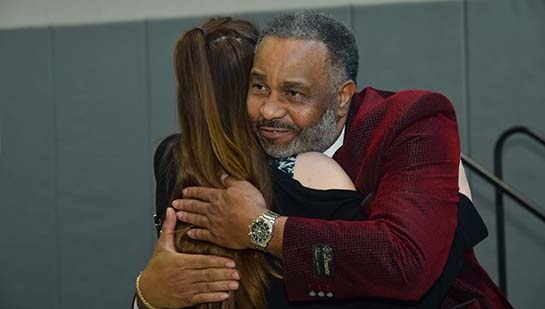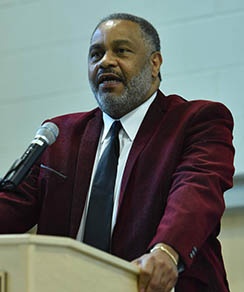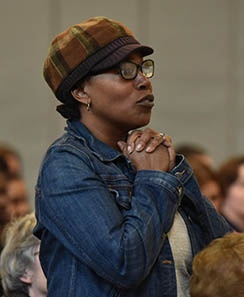
In a stunningly frank and emotionally gripping recollection of his horrific encounter with the Alabama criminal justice system, Anthony Ray Hinton mesmerized a crowd of 350 people who flocked to Community Hall on March 14 to hear his story.
 |
|
|
Hinton spoke to a crowd of 350
in Community Hall. |
|
 |
|
|
Questions from the audience showed
how his speech resonated with them. |
|
Hinton spent 30 years in prison, almost all of the time in a 5-foot by 7-foot cell on death row, for a crime he did not commit. Arrested in 1985, he was released last year when the U.S. Supreme Court unanimously ruled that his constitutional right to a fair trial had been violated.
"I went through 30 years of hell because I was black and poor," Hinton told the audience.
In a car with two white detectives after his arrest, Hinton pleaded to know with what crime he was being charged. One of the detectives told him that the charge didn't matter but named five reasons why Hinton would be convicted. "You're black, the victim was white, the prosecutor is white, the judge is white, and the jury will be white," Hinton recalled the detective saying.
Too poor to hire a lawyer, Hinton knew that his fate was sealed when the first words from his court-appointed attorney were "I did not go to law school to do pro bono work."
Hinton was convicted of killing two Birmingham, Alabama, men in separate incidents in 1985 although there were no eyewitnesses, no fingerprints linking him to the scene, and no physical evidence to place him at either location. During one of the murders, Hinton was seen working in a warehouse 15 miles away from the killing. He even passed a polygraph test that was never admitted into evidence.
Authorities relied on the analysis of a handgun found in his mother's house and bullets from the murders to convict him. Despite later conclusions by ballistics experts that the bullets did not match the gun, the state refused for years to reconsider the evidence.
It was only after the Equal Justice Initiative (EJI) argued on his behalf for more than 13 years that he was freed. Upon Hinton's release in April 2015, Bryan Stevenson, executive director of EJI, said, "We have a system that treats you better if you’re rich and guilty than if you’re poor and innocent, and his case proves it."
During his time on death row, 55 people were executed and 11 others committed suicide. He never knew if he'd be next.
He survived through his sense of humor (he traded jokes for "free world" food like Whoppers, which he shared with fellow inmates) and vivid imagination (his fantasy girl friends were Halle Berry, Sandra Bullock and Kim Kardashian). Besides his mother, who died while he was in prison, what he missed most was playing baseball. As a young man, he once worked out for the Seattle Mariners, who were impressed by his batting prowess but not by his speed ("I was as slow as a snail," he admits).
In a touching moment after the crowd had dispersed, Hinton picked up a softball bat and took some swings just as practice was about to begin. A pitcher motioned him toward the catcher, and, moments after expressing his love for baseball, he was taking some batting practice. He did himself proud, rocketing a few balls into the indoor netting.
"I do not hold any hatred," he told the crowd, "so I can sleep well at night. Bitterness kills your soul."
He does, however, have a cause. "Join me in a fight against the death penalty," he asked the students. "Demand change."
 CHALLENGE
CHALLENGE





